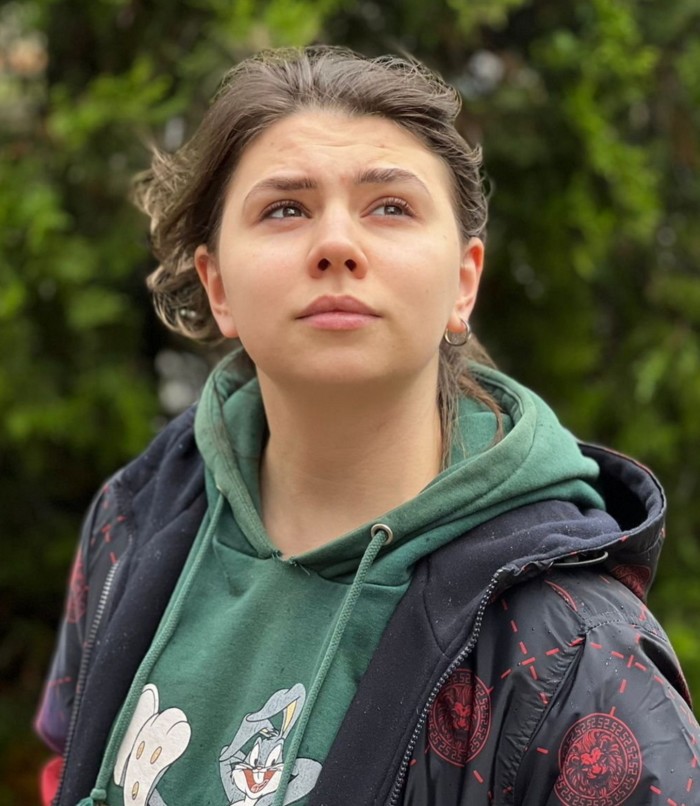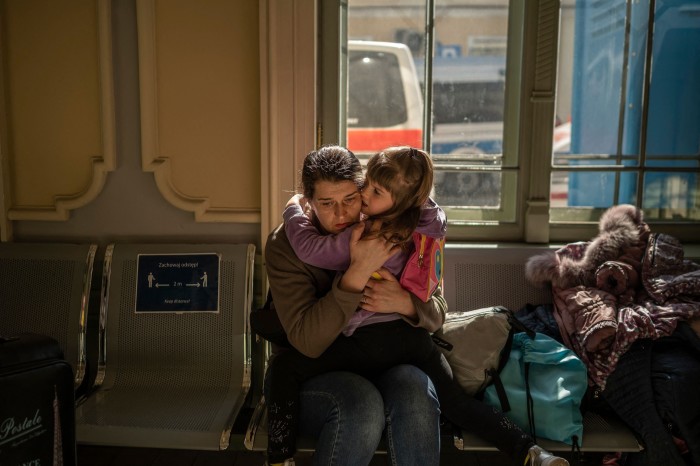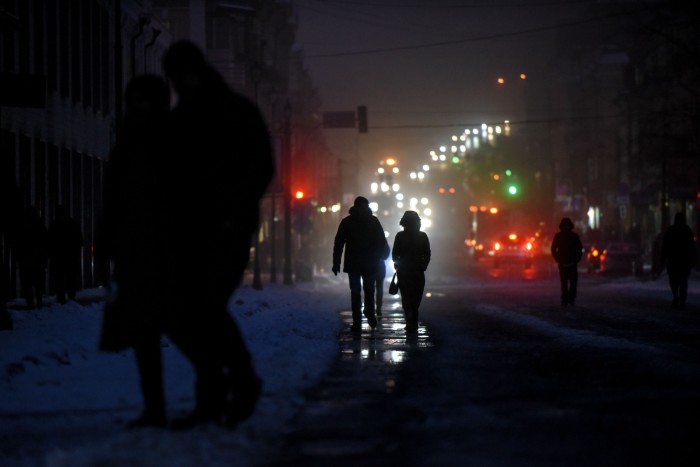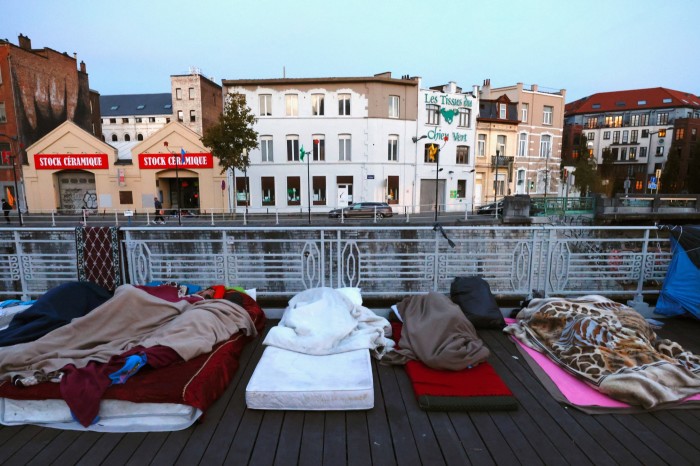Migration fatigue: Europe braces for new influx of Ukrainians
Polina Sydorenko, a 19-year-old Ukrainian student, was brimming with both hope and trepidation when she returned to Kyiv in late August, after five months sheltering from the war as a refugee in Italy. Yet her plans to pick up the pieces of her disrupted life at a prestigious university in Kyiv were depressingly shortlived.
Just weeks after her return, the veneer of normality that had been temporarily restored to the capital was shattered as Russia launched new missile attacks on key Ukrainian cities and critical civilian infrastructure — the most serious since the war began. The university where she studied drama shut down again. Sydorenko fled back to Italy, bringing another close student friend with her.
“The situation is awful,” says Sydorenko, adding that other Ukrainian friends in Italy who had been considering a return home have now dropped the idea. “It’s getting worse and worse and they don’t know what to do.”
As winter closes in on Europe and Russia sustains its bombardment of Ukrainian power and water facilities, EU member states are braced for many more Ukrainians like Sydorenko to head back to member states.
“The aim of Putin is to create a refugee crisis and to put even more pressure on us,” says Ylva Johansson, the EU’s migration commissioner.

At the same time, as Covid-19 restrictions ease and economic pressures mount, Europe is recording the highest influx of newly arriving migrants from north Africa, the Middle East and Asia since the migration crisis in 2015-16, which put immense strain on the EU and tested its political unity.
The combined pressures of these distinct mass movements of humanity — which have coincided with the rising influence of rightwing parties in several member states — have propelled the issue of migration back to the top of the EU’s political agenda.
So far, Europe has maintained its open-door policy towards Ukrainian refugees, many of whom went back home after the initial Russian onslaught was repelled. But with reception facilities in many countries under severe strain and fears of a renewed Ukrainian exodus, tensions are rising between member states over how to handle irregular migrants — people who do not fulfil the legal requirements to enter a country — from other parts of the world.

Italy’s new rightwing government, led by Giorgia Meloni, is leading calls both for tougher measures to keep out irregular migrants, and a new more equitable system for sharing the burden of accommodating new arrivals — something that has eluded EU countries for years.
“The political rhetoric around immigration is escalating right now around Europe, which underscores the difficulties many member states are having coming up with coherent solutions,” says Alberto-Horst Neidhardt, a migration specialist at the European Policy Centre think-tank.
“We are seeing an emergency situation in the refugee reception systems in many parts of the EU. The prospect of further arrivals from Ukraine, as well as other parts of the world, could put even greater strain on the authorities.”
Frostier reception
Europeans won widespread praise for their generous response to the first wave of refugees from Ukraine, encouraged by the EU’s unprecedented invocation of a 20-year-old but never previously used power to grant “temporary protection” to refugees fleeing a conflict. With that, Ukrainians were instantly granted the right to move freely within the EU, the right to work, and some income support.
Sydorenko was among about 173,000 Ukrainians fleeing the conflict that passed through Italy — many of them drawn to join family and friends already in the country. Italian families and civil society groups also opened their doors, donating supplies and helping dislocated students enter the school system.
“There was this overall sense in society of contributing to a heroic effort of resistance — that you are part of something big, part of history,” says Nathalie Tocci, director of Rome’s Institute of International Affairs.
Almost 10 months after the invasion, the warm welcome is giving way to fatigue as Europeans are pressured by rising inflation and government budgets come under strain.

The sheer numbers of refugees from Ukraine and elsewhere on the continent are striking. Between January and September, there were 4.4mn applications by Ukrainians for temporary protection in the EU — although hundreds of thousands are estimated to have returned. On top of that, EU countries plus Norway, Switzerland, Iceland and Liechtenstein received 680,640 applications for asylum from nationals of countries including Syria, Afghanistan and parts of Africa and Asia — up 54 per cent from the same period the previous year, according to the EU asylum agency.
Local authorities charged with housing and supporting refugees are struggling to cope. In Germany, where more than 1.1mn people have sought a safe haven this year, towns are scrambling to set up emergency shelters and convert gyms and hostels in an echo of the 2015-16 refugee crisis.
Municipalities are being forced to build mobile homes and rent rooms in hotels for the new arrivals, and say they are running out of school and kindergarten places and “integration courses” for adult refugees. Campaigners in Belgium say there are thousands of refugees living on the streets of Brussels, as the asylum system struggles to process their claims.
In Poland, where over 1.3mn Ukrainians registered for residency, a grassroots army of aid volunteers was initially hailed as a role model. But while Warsaw’s support for Kyiv remains unwavering, Ukrainians fleeing to Poland this winter will not find as generous a welcome as they did in the spring.
Poles are “afraid of the economic situation and inflation and are becoming more and more irritated by what they perceive as a favourable treatment of the Ukrainian refugees”, says Piotr Buras, who heads the Warsaw office of the European Council on Foreign Relations.

The Polish authorities have now ended many of the direct subsidies offered to Ukrainians, including free access to public transport and a one-time payment of 300 zloty ($67) that was claimed by over 1mn registered Ukrainians. From March, refugees staying in Poland for more than 120 days will have to pay 50 per cent of the cost of any government-provided accommodation.
In Przemysl, one of the main transit towns for Ukrainians entering Poland, nothing has been done to improve the rudimentary station through which five trains to and from Ukraine travel every day.
“While the local authorities’ initial response was impressive, there’s been no attempt to add seating, heat lamps or basic protection from the elements to make things easier for the many Ukrainians who come and queue up for hours out in the cold for the trains,” says William Flemming, a British activist with Kharpp, one of the many charities assisting Ukrainian refugees at the border crossing.
Double standards
Johansson, the migration commissioner, says that for the time being inflows into the union from Ukraine only modestly exceed the numbers returning to Ukraine, but that the EU has been undertaking contingency planning for new arrivals. “If we see millions of people coming during winter, of course there will be a huge challenge, but I think we will manage it well,” she told the Financial Times.
Nevertheless, member states that bore the brunt of the earlier wave of Ukrainian refugees are worried. Some diplomats stress that while Ukrainian refugees can move freely where they want inside the EU, the new arrivals tend to go to the big cities where there are already large numbers, adding to the strains on local authorities.
“For us it’s clear that if there were to be further migration from Ukraine, we would need better distribution throughout Europe,” Nancy Faeser, the German interior minister, said on Thursday. “I wish to underline again that this is an important area of solidarity.”

In Italy, Meloni has been stepping up complaints about the number of people from Asia and Africa landing on Italian shores in search of refuge and better economic opportunities. She and her coalition partners, including League leader Matteo Salvini, have long depicted the unregulated flow of migrants from Africa and Asia as grave threats to Italy’s national security and integrity.
Now in power, they are demanding more help from Europe — including a strong united “defence” of the EU’s external borders, a topic that is likely to feature at a summit of EU leaders on Thursday.
Under the EU’s so-called Dublin agreement, asylum seeker claims are to be examined and processed in the European country in which they first arrive — a rule that Rome claims puts undue pressure on Italy and other Mediterranean nations given the geography. Last month, Italy, Greece, Cyprus and Malta signed a joint letter demanding changes to the system.
Though France shepherded an initial agreement on disbursement of asylum seekers through the EU during its rotating presidency earlier this year, Italy has been scathing about the results, given that it is entirely voluntary and envisions the dispersal of 8,000 migrants across the bloc — just a fraction of those arriving.

“The relocations carried out until today are totally insufficient and the procedures themselves are long and cumbersome,” Italian interior minister Matteo Piantedosi told the FT. “In the end, it is only Italy and the other countries of first entry that take charge of economic migrants from north Africa.”
Nearly 96,000 irregular migrants have arrived in Italy via the Mediterranean Sea so far this year, an increase of 52 per cent from the same period last year, according to Italian interior ministry data.
The easing of Covid travel restrictions has enabled people to move unobstructed through Africa to reach points from which they can sail to Europe. At the same time, the cessation of hostilities in war-torn Libya has also enabled trafficking networks to resume their operations once again, according to Luca Barana, an expert on migration at Rome’s Institute of International Affairs.
Shortly after coming into office, Meloni’s government caused a crisis by refusing to allow NGO boats carrying rescued migrants to dock and unload their passengers for nearly two weeks, arguing that their work was also fuelling human trafficking by raising expectations people would always be rescued at sea.

Her government called on Germany and Norway to take responsibility for the ships, which were flying their national flags. Tensions between Italy and France erupted last month after Rome refused to allow a ship carrying 231 migrants rescued from the Mediterranean to dock at an Italian port, forcing it to sail to France to disembark its passengers there.
Andrea Costa, the founder of Baobab Experience, a civil society group that assists migrants, says he sees a double standard in Europe’s warm embrace of Ukrainian refugees, and the cold shoulder it gives to those coming from other regions. The attitude has implications for activists themselves, who can be accused of human trafficking for aiding new arrivals that land from across the Mediterrean.
“I am afraid to say it, but really it has a lot to do with racism,” says Costa. “It upsets me very much. If I have a van and it’s full of blonde, blue-eye kids coming from Ukraine, I have no problem. If I have eight black unaccompanied minors fleeing war in Tigray, Sudan or Somalia I am in trouble because I am doing something illegal.”
The issue of double standards has also been raised in Poland and other countries of central and eastern Europe, which have taken in Ukrainians escaping Russia’s war while erecting new border blockades to stop others.

Poland is now adding a fence at its border with the Russian exclave of Kaliningrad, similar to the one built earlier this year along 186km of its border with Belarus. The Polish government says border walls are needed to stop Russia and Belarus from pushing more illegal migration into the EU, but human rights organisations also say that this effort has been coupled with illegal pushbacks of asylum seekers from the Middle East and elsewhere.
“I note with concern that this double standard approach has led to feelings of being discriminated [against],” the UN Special Rapporteur on the human rights of migrants, Felipe González Morales, said after a July visit to Poland during which he praised its welcome of Ukrainian refugees but questioned its approach to others.
In Slovakia, thousands of mostly Syrian refugees are now trapped along the country’s border areas because Czech border police have prevented them from entering, while Hungary is refusing to take back those who travelled through Hungary into Slovakia. Local residents complain about refugees roaming the countryside, while aid workers are calling on the authorities to assist them urgently or grant them safe passage to another country.
As pressures within the EU mount, Johansson says she is optimistic that a long-discussed pact for migration — that would modify the Dublin pact and include a fairer way of distributing asylum seekers around the union — can be delivered before the end of the current commission in 2024.
“They really see the need [to] have a proper European legal framework in place to deal with migration together,” she says, stressing the parallel work the EU has been doing to facilitate returns of people deemed not to be eligible to stay in the union. “The increase of irregular arrivals is not unmanageable.”

Yet the EU remains deeply split over migration, as was shown at a ministerial meeting in Brussels on Thursday when Austria vetoed a proposal to expand the Schengen border-free area to Romania and Bulgaria. Vienna’s blockade prompted a furious reaction in Romania, where some politicians are demanding a boycott of Austrian companies.
Meanwhile, the inflow of new people pushed by misery at home to seek entry into Europe shows no signs of abating.
On a recent cold rainy night in Rome, Costa’s organisation was handing out packed dinners in plastic bags to destitute migrants near one of the city’s biggest bus stations. Among them was Awelky Nuru, a 28-year-old from Eritrea, who fled his home when 18 to avoid forcible conscription into the army.
A year ago, he managed to cross the Mediterranean in a three-day journey in a leaky boat with around 300 other people. He has struggled ever since. “I don’t have work, I don’t have papers, and I sleep on the streets,” he says.
But for all his hardship, Nuru insists he did the right thing to come to Europe. “I knew that it was dangerous, but I came to find a better life.”
Additional reporting by Barbara Erling in Warsaw, Guy Chazan in Berlin, and Giuliana Ricozzi in Rome
For all the latest Business News Click Here
For the latest news and updates, follow us on Google News.
